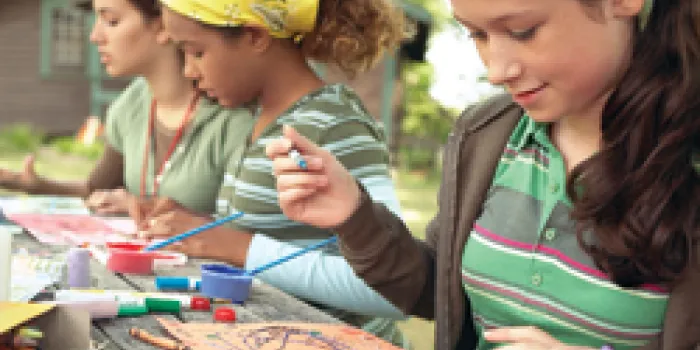When Michelle Cecil’s dad offered to send her to Europe in 2010, the Grafton, Wisconsin, teen hesitated. It would be the first time the 17-year-old would miss camp since she was 6.
“Without camp, I wouldn’t be as grown up as I am. I wouldn’t be as social,” says Cecil, who has type 1 von Willebrand disease (VWD). And she wouldn’t feel as accepted as she does today. Camp Bold Eagle in Holton, Michigan, was the one place Cecil and her sisters could go every year as a child to be surrounded by other kids with bleeding disorders.
But the camp experience for Cecil wasn’t all good. Although her “hemo homies” will always be her family, Cecil says she sometimes felt slightly excluded from camp activities because she didn’t have hemophilia. That picture is about to change. As more girls attend bleeding disorders camps, and as the National Hemophilia Foundation’s (NHF) Victory for Women campaign focuses on the role of camp in girls’ lives, camps are becoming more girl friendly.
When NHF’s manager of education, Patrice Thomas, held discussion groups at the 2011 NHF Annual Meeting in Chicago to identify what young women wanted from their chapters, the answer was nearly unanimous. They wanted more information at a younger age about what they could expect as they reached puberty. They also wanted details about how their bleeding disorders could be managed, particularly around their periods.
“I asked them when and where they thought the information should be offered, and they all said camp,” Thomas says. “They all felt like that week at camp is a wonderful opportunity to talk with nurses or counselors and older girls with bleeding disorders to help them understand.”
Infusion of Girl Power
One of the complications of having a bleeding disorder is menorrhagia, long and heavy periods. It’s a topic that just about every girl avoids discussing. But it’s essential for girls with bleeding disorders to learn to talk about their periods and find out how best to treat them. For instance, many young women use hormone therapy to regulate their periods. Others infuse around their periods to prevent excessive bleeding.
All girls should learn to infuse—for themselves if they need it, but if not, for their loved ones, says Marion A. Koerper, MD, former director of the Hemophilia Treatment Center at University of California, San Francisco, and co-founder of Camp Hemotion, the northern California bleeding disorders camp.
“Camp has two important functions: education and empowerment,” says Koerper, who is also NHF’s medical advisor. “Once girls understand their disease, they take control of it. Even though not every girl needs to self-infuse, we let all the girls who want to learn how.”
Changing Times
At the annual meeting of the National Association of Camps for Children with Hemophilia and Other Bleeding Disorders (NACCHO) this year, Shelly Mattson, 26, who has VWD, gave a presentation about how camp counselors can talk to girls about their bleeding disorders and their periods. Her advice: Make it private, listen more and try to have an adult woman with a bleeding disorder there to share her experience. NHF’s Victory for Women Task Force is creating a toolkit to help camp staff talk to girls about their periods.
Campers themselves are taking action, too. Last year, when Cecil was a senior counselor at Camp Bold Eagle, she got another counselor to cover her cabin of boys so she could attend a meeting with the camp director. About 15 chairs were set up around the room, filled with preteen and teenage girls as well as female counselors. The topic was changing camp language to make it more inclusive. The girls provided lots of feedback. They asked the director to be more mindful that not everyone at camp has hemophilia, that it’s not a “brotherhood” and that they wanted more programs for girls.
The camp director took the girls’ suggestions seriously, changing the language at the awards ceremony at the end of the week. Meanwhile, counselor Alexandra Johnson, 21, of East Lansing, Michigan, unveiled the new Ladybug Award. It was her solution to the coveted Butterfly Award, given to a boy camper who learns to self-infuse for the first time. The girls didn’t have an equivalent award, and Johnson, who has mild VWD, thought it was time.
To win the award, the girls had to learn all they could about their bleeding disorder. Then, at the end of camp, they took a test. Every girl who got a perfect score was given an award, a handmade ladybug necklace. Some of the winners did not even know their diagnoses at the beginning of the week, Johnson says. But by the end of camp, they not only knew their diagnoses, but also their treatments.
The girls gained something even more rewarding at camp that year—a sense of belonging. “They felt included and proud,” says Johnson. “They had a sense of self-confidence you didn’t see four days earlier.”

